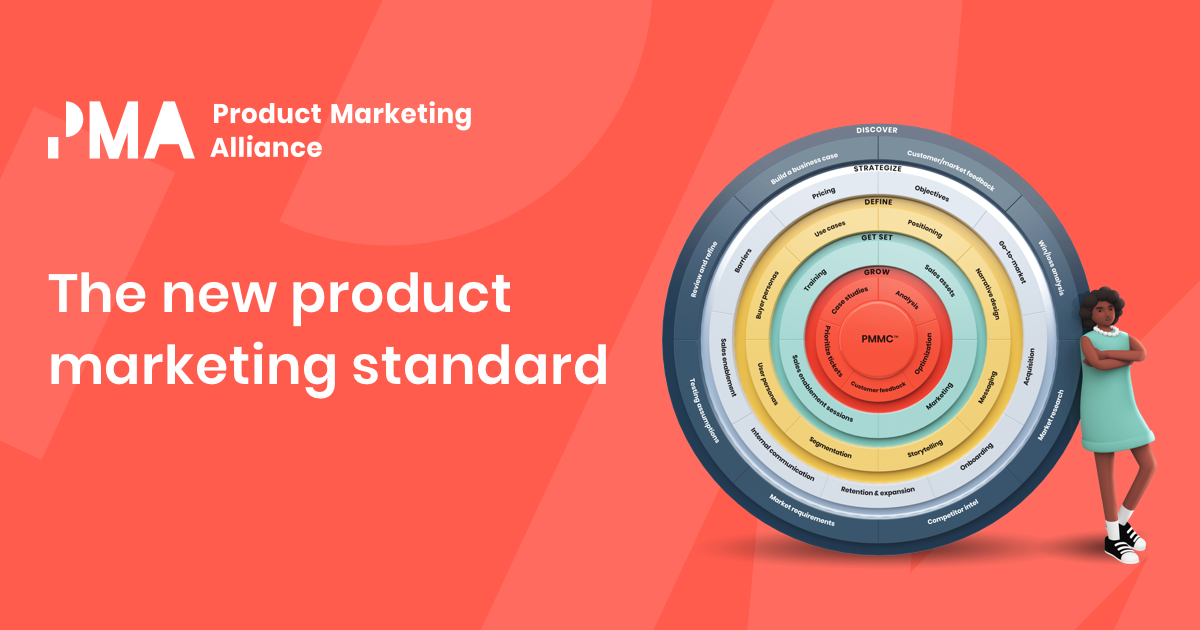A product launch feels like a huge undertaking, but without enough planning, customer, and market research, and overall preparation, it's impossible to expect anything to happen.
The key to success is understanding where you should focus your efforts and how to manage each step of the process.
The launch process is split into three sections: Pre-launch, the launch itself, and post-launch. There are certain steps you need to take throughout this process to achieve and surpass your goals.
In this guide, we'll go through each stage of the process in detail, covering key considerations and best practices, while sharing insights from leading PMMs who have been there and done it.
What is a product launch?
A product launch is a process in which a new product or service is brought to market by a company.
The primary purpose of a launch is to provoke a sense of anticipation and generate awareness of your product amongst your target audience.
As a collaborative exercise, product launches require input from different people within an organization to ensure the process is successful. These include sales, customer success, product, and product marketing.
What is the product launch process?
The product launch process refers to the steps companies follow when taking a product to market.
Processes vary depending on factors such as product type, industry, level of investment, forecast ROI, and so on.
Typically, the process involves:
- Identifying and targeting segments
- Designing product packaging
- Drafting slogans, taglines, and marketing campaigns
- Conducting competitive analysis
- Consulting PR firms
- Creating a product sheet detailing the features of your product or service
- Launching or updating company websites
- Advertising the product
- Promoting the product in the media
How do you pitch a product launch?
An effective pitch is pivotal to the success of any product launch. To do this successfully, you must combine thorough research, meticulous preparation, and an engaging presentation.
Here are some tips to help you prepare for the product launch pitch:
- Don’t settle for second best. You need to pitch your product to an investor that ticks all the boxes. Conduct thorough research before pitching so you’re not wasting your time and that of your attendees. Preparation is key to helping you find the right investor – don’t try taking any shortcuts.
- Make a good first impression. Investors team up with people they know, like, and trust – you never get a second chance to make a good first impression. You need to take this opportunity to ensure you convince a potential investor that you’re the right person to deliver on your promises and release a successful product.
- Be confident, but not presumptuous. While investors want to see a confident pitch, it isn’t appropriate to be overly confident. For example, insisting a potential investor sign a non-disclosure agreement isn’t acceptable. Bide your time, nail that all-important first impression, and focus on the specifics when/if the time comes.
- Include data in your pitch. Never underestimate the importance of data. Numbers can be your perfect ally if you’re faced with tricky questions or have to support claims made in your pitch. Always be sure to say where you got your data from, include comprehensive, granular information, and select stats that meet the requirements of your audience.
- Prepare for criticism. It’s important to prepare yourself for a tough crowd. You need to develop a thick skin and take potential criticism on the chin. Keep your eye fixed firmly on the importance of securing your investment, stay composed, and don’t get defensive.
Key considerations when launching a new product
Differentiating your product sets it aside from the competition and provides your target personas with a distinct reason to opt for your company – if competing products aren’t offering the same features, where else can they go?
As a product marketer, grasping the significance of product differentiation is essential for the triumph of your new product launch. Setting your product apart from the competition is crucial because it offers a compelling reason for your target audience to choose your product over market alternatives.
This differentiation not only attracts customers but also justifies the introduction of higher price points. In a market where uniqueness is highly valued, offering a product that stands out can significantly increase consumer interest and willingness to pay more.
Differentiation should go beyond mere features; it must address a specific need or pain point not being met by existing products. This approach is effective for both attracting new customers and maintaining the interest of current ones.
Your communication strategy should aim to humanize your product, making it relatable and easily understandable to your audience. Clear articulation of how your product alleviates a particular problem can establish a stronger connection with customers, building trust and enhancing the perceived value of your product.
Remember, avoiding technical jargon and speaking in terms your customers can understand is key to making your product relatable on a human level. This strategy can significantly accelerate adoption and drive success for your new product launch.

Which KPIs and metrics are important when launching products?
When launching a product, focusing on key performance indicators (KPIs) and metrics that truly matter is essential. Revenue should be at the forefront of these metrics. Surprisingly, many teams overlook setting a clear revenue target, yet without this, it's challenging to gauge the success of your launch. Knowing the revenue you aim to generate gives direction and purpose to your launch strategy.
Moreover, dissecting the revenue goal, especially for global businesses, is vital. This means setting regional revenue targets and considering the unique business and pipeline objectives of local sales and marketing leaders. Different regions may contribute differently to the overall goal, as market challenges and customer pain points can vary significantly from one area to another.
Your product’s value proposition should be clear and quantifiable. In the B2B sector, this often boils down to three core benefits: Enabling customers to make money, saving time or reducing costs, and minimizing risk. These benefits must be backed by hard data.
Merely stating that your product is faster or better isn’t enough. It's about providing specific, quantifiable values that the product delivers, which can make a real difference in your customer's operations.
For instance, if your product automates a process, quantify the efficiency gains. Detail how many people are required for the task, the time taken before and after implementing your product, and the overall efficiency improvements. These data points are crucial in justifying your product's value and setting it apart from competitors.
Another critical aspect is understanding your competition. Determine how many competitors you aim to displace with your launch and how you will handle objections.
Finally, triangulating personas and understanding geographic trends and nuances are crucial in tailoring your launch to specific markets and customer segments. These factors are integral to a successful product launch and should be a central part of your strategy.
It’s natural for companies to try their utmost to differentiate themselves from the competition – but what do you do if you’re truly struggling to set yourself apart from market alternatives?
Aligning metrics with the sales cycle
In aligning metrics with the sales cycle, particularly for revenue measurement, it's crucial to adopt a holistic approach. Start by looking at the overall revenue of the business yearly. Break this down by region – diving into your geographic data – and product to understand where your growth expectations lie.
This approach allows you to set nuanced revenue goals for each product, taking into account regional adoption rates and market feedback.
For instance, you might anticipate initial adoption in the U.S. and delay the push in Europe based on market signals. This decision should reflect the way your business is segmented across different regions. Such an approach helps in setting realistic and targeted revenue goals.
When setting these goals, integrate them with the broader business strategy. This step is often overlooked, as many businesses adopt a more generic approach, launching products globally without clear revenue sources.
A more analytical strategy, where you identify specific regional needs and how your product addresses them, can lead to more successful outcomes. For example, if a significant portion of your revenue is expected to come from the APAC region, tailor your strategy to meet the specific needs of that market.
While revenue is the primary metric, several sub-metrics under it need attention. These finer details make the goals actionable and give every team a clear understanding of their responsibilities.
Preparing for your product launch
How to prepare for a product launch
Preparing for a product launch involves adapting to different phases, each with its unique set of tasks and focus areas.
In the early stages, your days as a product marketer are predominantly dedicated to research and data assessment. This phase requires significant solitary time to delve into understanding market opportunities, analyzing trends, and identifying customer needs. It's a period of intense focus, where much of your time might be spent in deep analysis and strategizing.
As the product development progresses and you move closer to the execution stage, your role becomes more collaborative and dynamic. This phase involves frequent interactions with various teams across the organization. You'll find yourself leading meetings, creating marketing materials, gathering feedback, and coordinating efforts to ensure everything aligns perfectly for the launch.
Throughout these stages, your role is central to the product's journey. You act as the linchpin connecting different departments – from sales and marketing to the product team. This requires a balance between focused individual work and collaborative efforts.
Always be ready to switch gears, from deep strategic thinking to active cross-functional collaboration, as you guide the product toward a successful launch.
The steps involved in the pre-launch process
The pre-launch process of a product is multifaceted and complex, often likened to the submerged part of an iceberg, with the launch being just the visible tip. This process starts well before the actual ideation, focusing initially on thoroughly understanding customer needs. It's critical to ensure that every step of product development aligns with these needs.
As the product develops, it's vital to continually revisit the market to adapt and refine both the product and its messaging. This iterative process is essential to stay on track with market demands and customer expectations. Throughout this phase, your goal is to align all elements of the product and its promotion, ensuring they are ready for a seamless launch.
Coordination and clear communication across various teams are key. Everyone involved in the launch should be aware of the goals, targets, and the specific audience you aim to reach. As a leader, you need to ensure that the entire team is aligned and moving in the right direction.
On the day of the launch, your focus shifts to execution. All the preparatory work culminates in this moment, and the emphasis is on implementing the plans you've laid out. However, the work doesn't stop there. Post-launch, you should be ready to iterate and make adjustments based on feedback and market response.
How to use market research during a product launch
Market research plays a fundamental role in ensuring your product launch is executed to perfection. If you cut corners, not only will you be running the risk of attracting negative personas, but your lack of preparation could even benefit your competitors.
The good news is conducting market research is easier than it’s ever been before, with a host of dedicated customer and market tools available to help you gather essential qualitative and quantitative data.
Market validation: Your launch readiness checkpoint
Before you invest resources in a full-scale launch, you need concrete evidence that your product solves a real problem for real customers. Far from just another box to tick, market validation is really your insurance policy against launching something nobody wants.
The value proposition validation cycle
Successful validation follows a rapid iteration cycle that tests your core assumptions quickly and cheaply. This isn't about perfection. It's about speed and learning.
Here's your validation framework:
1. Customer research sprints
- Conduct 15-20 customer interviews within 2 weeks
- Focus on problem validation, not solution selling
- Document pain point patterns and urgency levels
- Quantify the cost of the problem for customers
2. MVP testing with beta programs
- Build the simplest version that demonstrates core value
- Recruit 10-50 beta users who match your ideal customer profile
- Set clear success metrics before launch (usage, retention, feedback scores)
- Create rapid feedback loops (weekly check-ins at a minimum)
3. Business case development
- Compile quantitative data from beta usage
- Gather qualitative testimonials and case studies
- Project realistic adoption rates based on beta conversion
- Calculate potential ROI for both customers and your business
Building your beta program for maximum insight
The most successful beta programs balance structure with flexibility. Leading PMMs leverage customer research alongside their experience in value proposition development to connect with sales and customer success counterparts to establish a process of rapid feedback.
Your beta program checklist should include:
- Recruitment: Target customers who feel the pain most acutely
- Onboarding: Provide just enough guidance to get started
- Engagement: Weekly touchpoints via surveys, calls, or in-app feedback
- Measurement: Track both usage metrics and sentiment indicators
- Iteration: Ship improvements during beta based on feedback
Go/no-go decision criteria
After your validation sprint, you need clear criteria for making the launch decision. This is about acting with data-driven confidence.
Green light indicators:
- 40%+ of beta users would be "very disappointed" without your product
- Clear, quantifiable value metrics from user feedback
- Consistent problem/solution fit across customer segments
- Beta users actively referring others or asking for paid access
- Sales and customer success teams confident in the value prop
Red flag warnings:
- Low engagement after initial trial (< 20% weekly active users)
- Unclear or inconsistent value articulation from users
- Feature requests that fundamentally change your product vision
- Beta users solving the problem with workarounds instead
- Inability to demonstrate ROI or clear success metrics
From validation to launch confidence
Market validation isn't a one-time checkpoint. Rather, it's an ongoing discipline that continues through launch and beyond. The key is building systematic feedback loops that inform not just your go/no-go decision, but your entire go-to-market strategy.
Remember, you need to test, iterate, and move on. The goal isn't to achieve perfection before launch. It's to gather enough evidence that you're solving a real problem in a way customers will pay for.
Your validation data becomes the foundation for everything else: your messaging, your pricing, your sales enablement, and your success metrics. Skip this step, and you're essentially launching blind.
Timing your launch: The art and science of market entry
Timing, unsurprisingly, can make or break your product launch.
Launch too early, and you risk entering an unprepared market. Too late? Your competitors have already captured mindshare. The sweet spot requires a blend of strategic analysis and market intuition.
The competitive timing trap
One of the most overlooked aspects of launch timing is competitive intelligence. Being unaware of other launches within your category can give competitors first-mover advantage in messaging, market education, and customer acquisition.
Your competitive window analysis should examine:
Direct competitor movements:
- Product roadmap intelligence (from sales teams, customer conversations).
- Patent filings and technical hiring patterns.
- Marketing spend increases and campaign launches.
- Partnership announcements that signal new capabilities.
Market readiness indicators:
- Regulatory changes creating new opportunities.
- Technology adoption curves reaching critical mass.
- Economic conditions affecting budget availability.
- Seasonal buying patterns in your industry.
Building your market feedback loop
The difference between good and great launch timing often comes down to feedback loops. The root cause of poor timing is usually is that there's no feedback loop in place. Without continuous market signals, you're essentially guessing.
Here's how to establish an effective feedback system:
1. Pre-launch signal gathering
- Weekly sales team debriefs on competitive mentions
- Customer advisory board pulse checks
- Social listening for problem discussion intensity
- Industry analyst briefings and reactions
2. Continuous market monitoring
- Set up competitive intelligence alerts
- Track job postings in your space (hiring = investment)
- Monitor funding announcements in adjacent spaces
- Analyze search trend data for problem-related queries
3. Go-to-market flywheel
To get the product launch right, you need a systematic and very continuous two-way process that establishes a flywheel effect. This means:
- Launch → Gather feedback → Adjust positioning → Measure impact → Iterate
- Each cycle informs the next product release or feature launch
- Market timing insights compound over multiple launches
Your launch timing decision matrix
To systematically evaluate your timing, score each factor on a 1-5 scale:
Market factors (external):
- Competitive landscape stability (5 = no major launches expected)
- Customer budget availability (5 = budgets approved and available)
- Market education level (5 = problem widely understood)
- Regulatory/compliance readiness (5 = clear path forward)
Organizational factors (internal):
- Product readiness beyond MVP (5 = polished and tested)
- Sales team enablement (5 = fully trained and equipped)
- Marketing asset completion (5 = all materials ready)
- Support infrastructure (5 = scaled for expected demand)
Scoring guide:
- 32-40 total: Green light for immediate launch
- 24-31 total: Proceed with caution, address gaps
- Below 24: Delay launch, significant risks present
Seasonal and event-based timing
Beyond competitive factors, consider these timing other accelerators, like major trade shows, as well as analyst and user conferences. Each represent a natural launch moment. Similarly, it's important to take into account seasonal factors like budget cycles, holiday impact, and industry-specific slow/busy seasons.
Learning from timing missteps
The most expensive timing mistakes often stem from internal pressure rather than market signals.
Common timing pitfalls to avoid:
- Launching because the product is "ready" (internal view) versus when the market is ready (external view)
- Ignoring competitive intelligence to meet arbitrary deadlines
- Underestimating market education requirements
- Focusing on features rather than market problems
Making the timing call
Ultimately, perfect timing is a myth. But strategic timing (informed by competitive intelligence, market feedback, and organizational readiness) dramatically improves your odds of launch success.
The key is balancing urgency with preparedness. Success comes from effective positioning and messaging distributed through the right channels to the right audiences. Get the timing right, and everything else becomes easier.
Your next step? Run your launch through the timing decision matrix this week. The insights might surprise you—and save you from a costly timing mistake.

What are the different launch tactics available to PMMs?
There are three types of product launches:
- New value creation: These types of launches grow your company’s revenue streams and are new products or features that further address your customers’ needs.
- Maintenance and support releases: These releases are focused on preserving the revenue of your products that’re already on the market. You need to make sure that you make continuous changes to your offering to ensure that customer expectations are being met.
- Internal product releases: Though these releases aren’t public facing, this doesn’t mean they’re less important than new value creation or maintenance and support releases. They support the day-to-day running of your product.
The essential steps for product launch success
As part of any product launch, certain things are indispensable as you and your team strive for success: Customer development, positioning and messaging, internal communication, effective planning, great content, and awesome team morale.
Customer development
Customer development is a term relating to understanding your customer.
Any great product launch is built on the knowledge you have about your customers; the more you know about them, the more equipped you are to launch a product that’s likely to tick all the boxes and address their pain points.
There’s an abundance of customer and market research tools designed to help you learn more about your prospective buyers – don’t put them to waste! Use them, delve into the data, (qualitative, quantitative – or both), identify trends, and act on bonafide customer needs.
Positioning and messaging
This stage of a new product launch is based on three essential questions: Who is this product for? What does the product do? And most importantly, why is your product different?
To start with, familiarize yourself with these key terms:
- Target: Prospective customers you’re hoping will buy your product
- Segment: A defined group of people who have a particular attribute that makes your product or service attractive
- Brand: The name of your product
- Category: A competitive frame for the target audience. Consider who it is you’ll be competing against and think of a way to make your option more appealing
- USP: This is your unique selling point; what do you have that the competition doesn’t?
- Proof: Hard evidence to back up your claims
When you’re positioning your product and constructing your messaging, don’t just tell your customers what features are included as part of the package – they can find this information out for themselves. Explain why these features are going to make their lives easier, and why they should invest.
Internal communication
There’s no room for keeping secrets when you’re planning a new product launch; you need to be sure everyone contributing to the process is aware of your positioning, so communicate internally to align expectations.
Building customer relationships is essential, but internal teams also need to be pulling in the same direction and excited by the prospect of the new product launch, and if this means popping on a pot of freshly brewed coffee and doing overtime to build your bank of internal advocates, then so be it.
Forward planning
Product launches at big and small companies are planned to precision, and the same principle must apply to you.
Speak with multiple teams and pick their brains for ideas, before considering A) the impact each idea will have on the launch, B) whether you think the idea is feasible, and C) if you did include it in the launch, how easy would it be to test its effectiveness?
Planning allows you and your team to put contingencies in place to navigate any curve balls that may come your way. The process can be stressful enough as it is, so why make things harder for yourself?
Carefully map content
There are plenty of content and opps tools to help you create material that’ll make your competitors green with envy.
Remember, these will be the assets you’ll be using on the big day and form a critical part of your product launch plan, so don’t skimp on the details – they’re a big deal. There’s nothing worse than working tirelessly for weeks, sometimes months on end, only to let yourself down with mediocre assets to accompany your launch.
Always make sure content is relevant and measurable. Data and insights are invaluable when you’re launching a product, as they’ll essentially tell you if your product launch has been a resounding success or a terrible flop.
Also, never be afraid to tease your audience and give them hints about what’s to come when putting together your content plan.
Maintain team morale
Internal communication is the glue that holds any product launch plan together. If teams in the company are none the wiser, how can you possibly be expected to execute your launch to perfection?
When you're holding meetings, consider holding multiple sessions in which you can tailor your agenda to each relevant group of people.
For example, if you’re discussing sales enablement with the sales team, you don’t need non-sales staff there with you – their attention will wander and your big day could suffer as a consequence.
Keep your team motivated and keep calm; if you start to wobble, your panic will be noticeable and it can easily rub off on other members of the team.

How to write a new product announcement
Know your audience
It’s essential to understand who the audience is that you’re catering to. The tone of your messaging will be dictated by the age of your audience, where they’re from, their interests, and so on. It’s fundamental to get this spot on – failing to do so will see your announcement fall short.
Be succinct
Keep things simple and be succinct in your approach. Adopt a simple approach, and start your announcement by simply telling the audience you’re releasing a new product. Never go into full sales mode from the offset – you can adopt this stance in the later stages of your announcement.
Describe the product
Unsurprisingly, your audience will need to know what they’d be getting if they were to invest in your product.
Outline the key USPs and main benefits. Don’t overcomplicate things – you need to make sure the audience identifies with why your product could be beneficial to them and meet their needs. Emphasize what they’ll accomplish, should they decide to invest.
Call to action
End the announcement with a rallying call that’ll entice your prospective buyer to put their hand in their pocket and buy the product.
How to influence cross-functional teams during a product launch
Influencing cross-functional teams to align with your timelines can be one of the toughest parts of product marketing. Everyone’s juggling their own KPIs, and carving out space for yours means getting people to care, often when they’re already stretched.
The key? Show them how your priorities ladder up to broader business goals. Framing your projects with clear, data-backed impact (like reducing churn or unlocking new revenue streams) gives you a far stronger case for buy-in.
But it doesn’t stop there. You also need to connect your initiatives to their goals. Whether it's a feature that helps sales close faster or one that reduces support tickets, translating your “why” into their “win” turns collaboration from a burden into a shared opportunity.
Tailoring your communication is equally critical. In much the same way as you'd segment customers, you should segment internal stakeholders by department, objective, and even personality. Leading PMMs customize briefs to highlight what matters to each team to avoid overwhelming them with irrelevant details.
The importance of strong internal product roadmaps
Roadmaps should follow the same logic: simple, role-specific, and stripped of noise. Bringing people into the planning process early helps, too. When stakeholders contribute to the strategy, they’re far more likely to take ownership of it. Involving them in shaping the plan, rather than just receiving it, can transform resistance into advocacy.
Clarity and consistency are non-negotiable when it comes to product launches. Be specific with deadlines, follow up regularly, and document everything. A weekly roadmap update or a simple check-in can go a long way in keeping your project on track.
Finally, don’t underestimate the power of preparation and presentation. Anticipate objections, know your numbers, and speak with clarity and conviction. Use visuals to simplify complex information and make your updates stick. Charts, diagrams, and clean roadmaps beat walls of text every time.
When you combine structure with empathy, clarity with context, and data with storytelling, you’re creating shared momentum – something that's vital to launch success.
Working with product managers during a product launch
As a product marketer, your collaboration with the product management team is crucial to identify performance metrics that matter to the end-user. It's essential to challenge your product teams if they aren't providing the insights you need to market effectively. Product development focuses on innovation and feature creation, but your role is to translate these features into benefits that resonate with potential buyers.
Product teams may excel in creating new features, but the real question is whether these features address the actual needs of the end-user. To find this out, dig into the conversations product teams have had with users. For instance, if the product team mentions that a new feature can reduce a three-person, two-day task to a two-hour solo job, that's a goldmine for your marketing narrative.
Working with sales during the product launch process
A product launch isn't just about creating buzz and excitement; it's also a significant exercise in change management. This is particularly true for sales teams, who often face the challenge of adapting to new products and strategies.
Salespeople aren’t just selling a product. They're guiding prospects through a mental model shift. A new product launch can disrupt this process.
It's not necessarily a matter of sales reps being unable to handle change, but rather that the launch strategy may not align with their existing sales processes. The key is to integrate the benefits of the new product into the sales teams' current strategies and customer interactions.
In the competitive SaaS industry, where new launches are frequent, product marketers should focus less on the allure of the new product and more on how it fits into the existing sales enablement, playbooks, and mental models of sales reps.
The success of a product launch should be measured not just by its initial impact but by how well it integrates into and enhances ongoing customer relationships and sales strategies.
In that sense, the challenge isn't just about managing a product launch but also about effectively molding the launch to fit within the existing frameworks that sales teams are comfortable with. This approach ensures that the launch isn’t just a fleeting moment of excitement but a sustainable addition to the sales process, enhancing the overall strategy and customer engagement.
The role of sales enablement in a product launch
Sales enablement plays a pivotal role in the success of product launches. Launches involve coordinating multiple aspects, including business strategy, product strategy, and market dynamics, all while considering the varying capabilities of your sales team.
There's often a disparity in performance among sales reps, and a launch can highlight this gap. The challenge lies in enabling the entire team to effectively understand and promote the new product or feature.
Enablement isn’t just about introducing a new product or feature and leaving the reps to figure it out. It's about systematic education and support. The aim is to level the playing field, ensuring that all reps, not just the top performers, are equipped to understand and sell the new offering. This involves creating and enforcing specific sales plays that’re aligned with the launch.
Beyond just explaining what the new product or feature does, it's crucial to emphasize its relevance and urgency. This is what drives the success of sales plays in the field. A common reason for the failure of launches is the lack of translation of features into value, and more importantly, why that value is relevant to the customer at this moment.
The importance of the post-launch process
While companies are often thorough when completing the stages up to a product being released, companies are sometimes guilty of neglecting the post-launch process, despite its importance to ensuring a product’s sustained success.
How to build on post-launch wins
Building on post-launch wins is a crucial part of maintaining momentum and maximizing the impact of a product launch.
In product marketing management, there's often a tendency to create numerous content and assets and simply hand them over to sales teams. However, this approach can lead to information overload, with most reps forgetting the guidance provided, which means both training and coaching in the sales enablement process are key.
There are two essential aspects to this: The push and the pull. On the pull side, a powerful tactic is to highlight and publicize successful deal wins. When sales reps share their success stories – detailing how they used specific strategies and messaging to close deals – it lends much more credibility than if the same information came directly from product marketers.
These real-world examples not only validate the strategies but also provide insights into opportunities and gaps that may not have been apparent at launch. Learning from the field is invaluable in refining and improving ongoing strategies.
On the push side, it's important to ensure that sales reps are accurately recording the plays and methodologies they use in the Customer Relationship Management (CRM) system. This data allows sales managers to coach their teams effectively and address any reluctance to adopt certain approaches.
Sharing deal wins is a particularly effective strategy. It not only dispels skepticism but also fosters a bit of healthy competition among sales reps. In the sales environment, where competition can be a strong motivator, celebrating these wins can drive others to replicate that success.
The secret to successful launches
The key to successful product launches lies in having a unified definition of success across all teams. Without this shared understanding, there's a risk of disappointment post-launch, as different teams may have varying expectations of the outcomes.
For PMMs, it's essential to establish clear objectives for the launch and ensure that everyone is aligned with these goals. Sometimes, this might involve making tough decisions or setting expectations that a launch might not directly impact sales, and that's perfectly acceptable. What's important is that everyone involved is aware of this and isn’t measuring success by the wrong metric.
If the primary objective is to drive sales, then it's crucial to focus on substantive strategies rather than just creating hype. This means working closely with sales reps, understanding their needs, and tailoring your positioning and messaging to ensure they are fully equipped at the time of launch.
Achieving consensus on what success looks like can be challenging, but it's the responsibility of the launch owner to steer this alignment. The most smoothly executed launches, and those that leave teams most satisfied afterward, are those where this alignment has been successfully achieved.
Clear, shared goals not only guide the launch efforts but also set the stage for evaluating its success cohesively and realistically.
Ready to take things up a notch?
Launching successful products sits at the heart of the product marketing role, so much so, that over 80% of PMMs identify product launches as a core element of their role.
Master go-to-market strategy, deliver unassailable launches, and ascend the product marketing ranks with Go-to-Market Certified: Masters.
Go-to-Market Certified features everything you need to consolidate your knowledge of key GTM principles and understand how this bread-and-butter deliverable works.
Completing this course will help you:
🚀 Execute successful product/feature/market launches
💡 Own GTM strategies at companies large and small
🎯 Understand GTM tactics during pre-launch, hard-launch and post-launch phases
🤝 Keep products on the market by effectively owning the full customer cycle
🧠 Confidently and effectively project manage the whole GTM cycle cross-functionally


















 Follow us on LinkedIn
Follow us on LinkedIn






.svg?v=8154f0fdee)